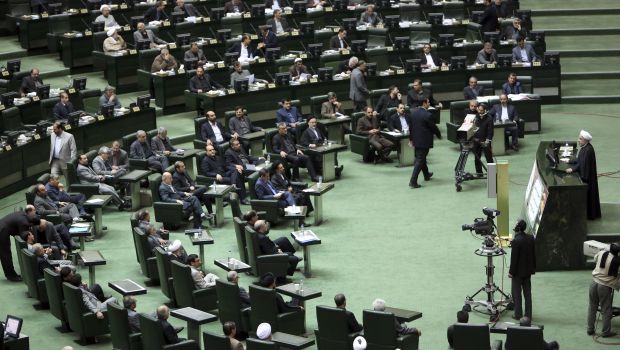
Iranian President Hassan Rouhani speaks during a parliament session in Tehran, Iran, Sunday on November 17, 2013. (AP Photo/Ebrahim Noroozi)
The motion states that Iran’s nuclear program is exclusively for peaceful purposes, but also says that the text of the motion cannot be altered by international negotiations.
According to the MEHR news agency, the motion demands the government of the Islamic Republic uphold previous legislation calling for Iran to produce up to 20,000 Megawatts of nuclear electricity, amid other goals outlined in the “20-Year Visionary Plan” approved by Supreme Leader Ayatollah Ali Khamenei.
The motion also tasks the government with upgrading Iran’s uranium enrichment facilities, including the installation of more advanced generations of centrifuges than the models currently used in the uranium enrichment facility in Natanz, in central Iran.
In addition, the proposed motion legislates for the creation of a larger national stockpile of enriched uranium, as well as further development of the country’s uranium mines, and calls for the continuation of uranium enrichment to 20 percent—a key concern of the West.
The motion also explicitly demands the completion of the controversial heavy water reactor at Arak. In the last round of negotiations in Geneva two weeks ago, France demanded a halt to the construction of the Arak reactor, which was resisted by Iran, reportedly leading to the failure to reach an agreement.
Critics of the Iranian nuclear program say that the Arak reactor is superfluous given Iran’s mastery of uranium enrichment, and that it raises suspicions that the plutonium produced by the reactor could be diverted into the construction of an atomic bomb.
However, others say that because the reactor is under inspection by the International Atomic Energy Agency, Iran could not divert plutonium undetected. The extraction of plutonium for a weapon would also require the construction of a processing facility, which Iran does not currently possess.
“The MPs have come up with this motion in order to defend Iran’s nuclear diplomacy and protect Iran’s nuclear rights,” Javad Karimi Ghoddosi, one of sponsors of the motion, was quoted as saying by the MEHR news agency.
Iranian Deputy Foreign Minister Seyed Abbas Araqchitold reporters on Tuesday that failure in previous round of negotiations in Geneva has made reaching an accord a more difficult task, because “we have seen lack of confidentiality by leaking the contents of meetings by the other side.”
Speaking with the ISNA news agency, Araqchi said: “First, we have to regain the confidence and then focus on reducing the scale of disagreement if we are to achieve an agreement.”
In a parallel development, Iranian Foreign Minsiter Mohammad Javad Zarif posted a video message on Iran’s nuclear program on YouTube before leaving Mehrabad Airport for Italy on Tuesday morning.
In the message, Zarif called on the global public to judge the issue of Iran’s right to nuclear energy for themselves, and said the nuclear program was meant to uphold “Iranians’ right to self-determination and entitlement to determine their [own] destiny.”
After meeting with Italian officials, Zarif will be heading to Geneva to attend the latest round of negotiations between Iran and P5+1.
